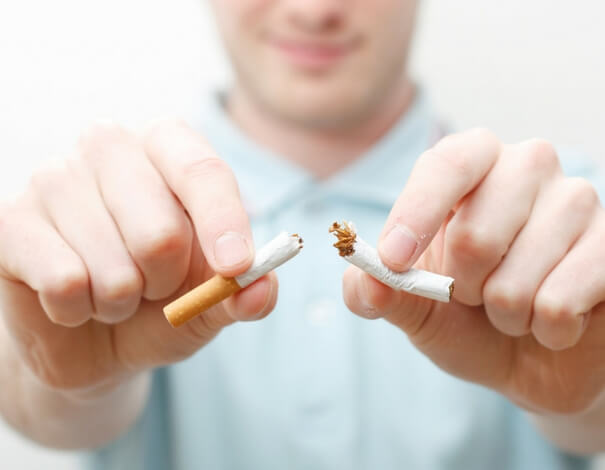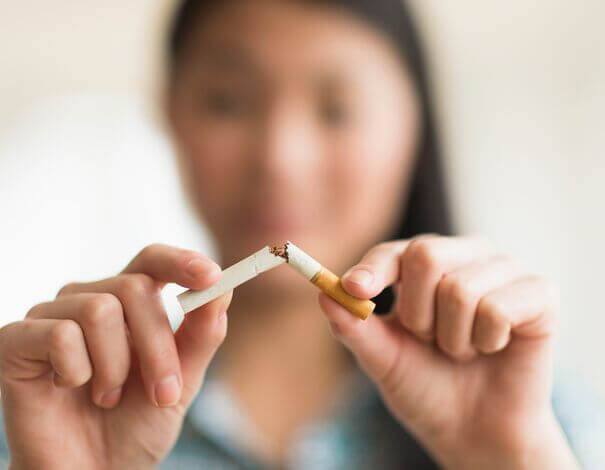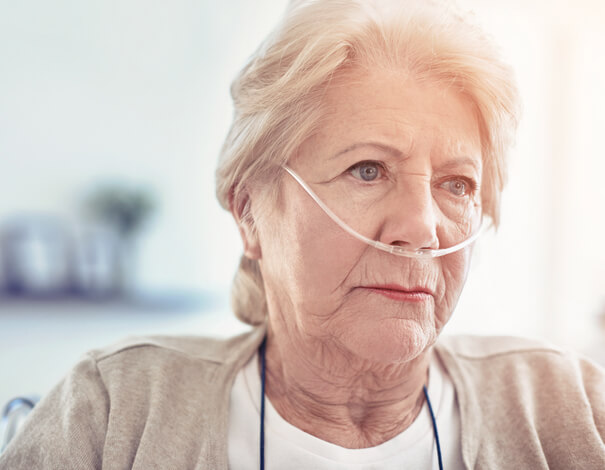Withdrawal symptoms to expect when you quit smoking
Quitting smoking is not easy! Withdrawal symptoms can be difficult to manage for many smokers. Knowing what to expect can help you cope better with withdrawal and increase your chances of quitting for good!
What causes withdrawal symptoms?
It is the nicotine in tobacco products that causes physical dependence. It increases heart rate and blood pressure and causes muscle relaxation. It can cause a sense of well-being or a temporary energy boost. It also alters the release of natural chemicals in the brain, making smokers temporarily more alert and calm.
As the days go by, your body gets used to certain effects of nicotine. Sometimes just a few hours without smoking can cause withdrawal symptoms. Many people continue to smoke to avoid these unpleasant symptoms, and a vicious cycle of addiction begins.
Over time, smoking also becomes an integral part of everyday life: smoking with friends, during a break at work, with a coffee or beer, to relieve stress or boredom, or even just to keep the fingers busy. This is a psychological addiction to nicotine.
How long do withdrawal symptoms last?
The symptoms of quitting smoking are unpleasant, but you should look at them in a positive light: they are a sign that your body and mind are adjusting and returning to their natural state.
The physical withdrawal symptoms are temporary and there are several ways to alleviate them. The first week is usually the worst, as your body eliminates all the nicotine it has accumulated. The peak of physical withdrawal symptoms occurs in the first 3 or 4 days, although they may persist for the first month.
Withdrawal from psychological addiction takes much longer because you have to learn to separate nicotine from your lifestyle. But with persistence and support, it is possible.
An ex-smoker's first year of abstinence is the one with the highest risk of relapse.

How to deal with Nicotine withdrawal symptoms
On average, smokers try to quit at least six times before they finally succeed. There is no need to beat yourself up if you relapse. In fact, relapse should be seen as an opportunity to learn. What was the most difficult withdrawal symptom to live with and overcome? What situation made me want to smoke? What trick worked well? Was it the right time to quit?
Many smokers lose confidence in their ability and willingness to quit after repeated relapses. These fears may be related to having started smoking again in spite of efforts to quit, to a negative view of past experiences, or to a loss of confidence in our ability to go through emotions or situations that make us want to smoke.
To regain confidence, get to know yourself as a smoker. Here is a simple 3-step process.
- Keep a diary of your cravings for one week. Identify the time of day the cravings occur, what triggers them and their intensity, what you felt at that moment (emotions, unpleasant physical sensations), and what you did to not succumb to them (successfully or not).
- Then set small, achievable goals. For example, you could set a goal not to smoke when you're bored or when you have a glass of alcohol. If necessary, divide your goals into steps (for example, step 1 - wait 5 minutes after a drink before having a cigarette; step 2 - smoke every other time). Learn how to experience success now.
- Finally, identify what motivates you to quit. Identify what quitting means to you. The reasons you find will be powerful motivators to succeed during the most difficult times. Post these reasons in a prominent place where you will see them constantly.
Common symptoms of withdrawal and tips on how to overcome them.
- Cravings
- Dizziness
- Insomnia
- Tiredness
- Irritability
- Cough and sputum
- Constipation
- Taste for sweet food and cravings
Cravings
Even if they last only a few minutes, cravings are probably the most disturbing withdrawal symptom because they can be very intense, especially at the beginning. It is therefore important to know what to do when they occur and to remember that they do not last long.
- Identify the situations you associate with smoking and try to replace them with something else, such as going for a walk during your break or after meals.
- Focus your attention on something other than smoking, such as listening to music, reading, or communicating with a loved one.
- Nibble to occupy your mouth; choose a healthy food (such as raw vegetables) or sugar-free gum or candy.
- Use a fast-acting nicotine replacement product (e.g., gum, lozenge).
Cravings eventually diminish and then disappear over time, but they can sometimes last for years. Learning to use some of these techniques is an important part of staying sober for a long time.
Dizziness
Dizziness may occur on the first or second day. The effect of nicotine decreases rapidly in blood circulation and heart rate. It is possible that better oxygenation of the body can lead to dizziness. The stress of quitting smoking may also play a role. If you feel dizzy, take a few deep, slow breaths while expanding your chest and abdomen, such as when yawning, and stretch.
Insomnia
Many ex-smokers have trouble sleeping during the first few days or weeks after quitting. Avoid stimulating foods and beverages (e.g., coffee, soft drinks, chocolate, energy drinks) at the end of the day and in the evening. In the evening, try quieter activities: go for a walk, take a bath, relax. Close screens an hour before bedtime.
Tiredness
Tiredness is common for the first 2 to 4 weeks. The body is going through a period of detoxification. Remember that nicotine has a stimulating effect on the body. Get enough sleep, about 7 to 8 hours a night, eat healthy foods and drink plenty of water. And don't forget to exercise! Exercise reduces stress, increases circulation, and releases natural chemicals in the brain associated with well-being.
Irritability
When you quit smoking, you may feel angry, impatient, and irritable. Talk about it with those around you so they can understand the cause of your mood swings and help you get through them. Did you know that laughing is a great way to relax? You can even force yourself to laugh for 2 or 3 minutes. Laughter massages your internal organs, increases blood circulation, and relaxes tense muscles.
Cough and sputum
During the first few weeks after quitting, the vibrating cilia in your lungs will gradually start working again, helping to clear the tar that has built up in your airways.
Drink plenty of water to clear up mucus and make it easier to cough up. Exercise, preferably outdoors, to oxygenate your lungs. As the days go by, your lung capacity will improve and being active will become easier.
Constipation
This is an effect you may not expect. Nicotine stimulates bowel motility. When you stop smoking, your body needs to regain its natural regularity.
Drink plenty of water, eat plenty of fruits, raw vegetables, legumes, and whole grains. The fiber, which is not digested, increases the volume of the stool and stimulates the bowel to push everything toward the exit. Regular exercise is also very helpful in reducing constipation.
Taste for sweet foods and increased appetite
Nicotine interferes with the metabolism of sugar. When you stop smoking, the hunger signal gradually recovers over a period of 3 to 4 weeks. Taste and smell also improve after two days of not smoking. Everything tastes better and is more enjoyable to eat.
Sweet taste stimulates the same areas of the brain as nicotine. When you quit smoking, it is tempting to replace smoking with sweet foods to get the same satisfaction. Ask yourself if you are really hungry, or if you would rather just have something to occupy your mouth with. Eat healthy snacks rich in protein (but in reasonable amounts) and include complex carbohydrates (whole grains, legumes) in your meals. Finish your meal with fruit instead of a sweet dessert.
Support, an important part of quitting
Many organizations offer help lines or online support services. To find out what services are available in your province, click here. Some companies also offer support programs for employees who want to quit smoking.
It is easier to quit smoking if pharmacological aids are used to reduce the physical withdrawal symptoms. In most provinces, pharmacists can prescribe smoking cessation treatments. These treatments are usually reimbursed by drug plans under certain conditions.
Talk to your pharmacist if you're thinking about quitting. They are a valuable ally to guide you!
The pharmacy services presented in this section are offered by pharmacist owners who are affiliated with Uniprix. The pharmacists are solely responsible for the professional activities carried out during the practice of pharmacy. These services are offered in participating pharmacies only. Certain fees and conditions may apply.
* The information contained herein is provided for informational purposes only and is not intended to provide complete information on the subject matter or to replace the advice of a health professional. This information does not constitute medical consultation, diagnosis or opinion and should not be interpreted as such. Please consult your health care provider if you have any questions about your health, medications or treatment.




